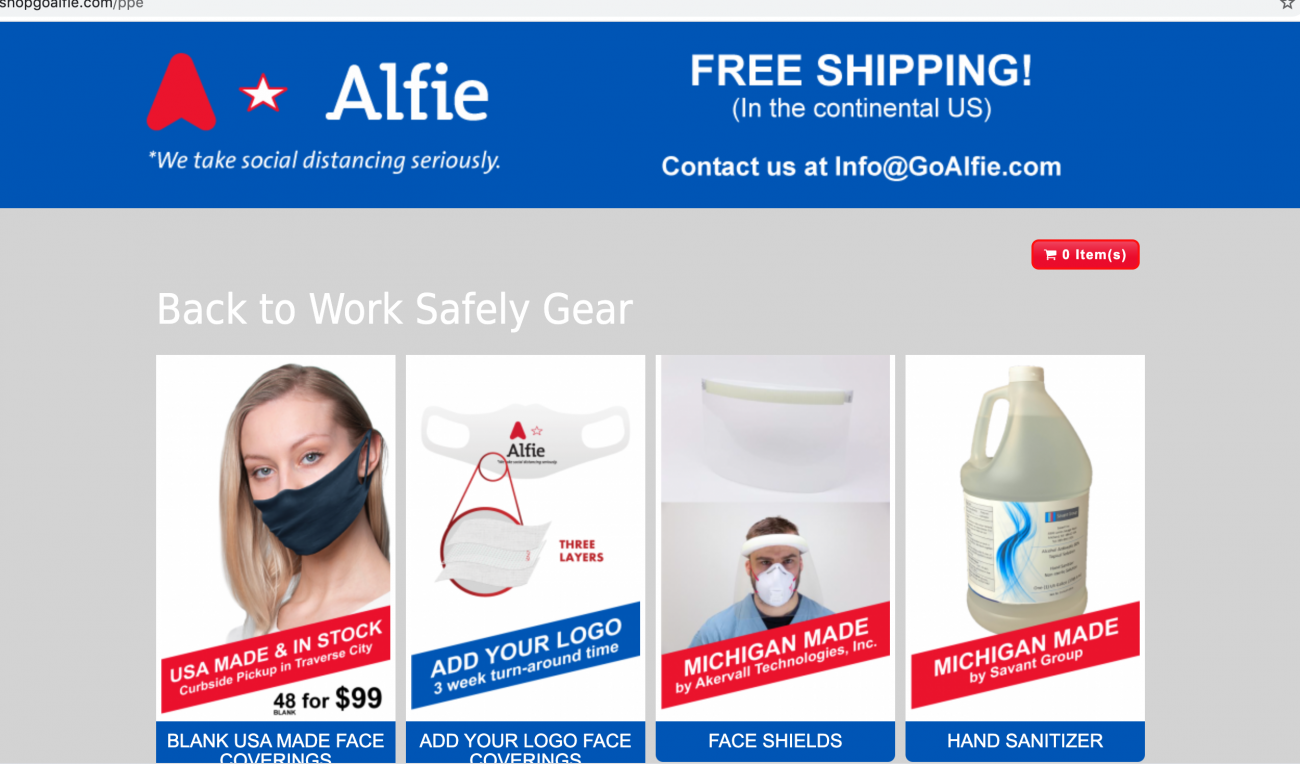As Michigan economy nears reopening, businesses scramble for protective gear

LANSING — The new normal is coming for Michigan businesses, as Gov. Gretchen Whitmer prepares to begin reopening the economy. And that means the hunt is on for masks.
Like hospitals before them, businesses statewide face the prospect of having to compete for personal protective equipment that remains in high demand amid the global pandemic.
Many are searching to secure masks, gloves, face shields and gowns to protect workers from the coronavirus, as well as thermometers to take temperatures before shifts and plexiglass barriers to separate workstations.
Construction crews the governor will allow to return to work by May 7 often use the same type of N-95 face masks that hospitals are now clamoring for, and it’s “been more difficult than usual to” secure supplies, said Kevin Koehler, president of the Construction Association of Michigan.
- The latest: Michigan coronavirus map, curve, chart, updated COVID-19 news
- Michigan’s latest stay-home order to allow landscaping, boating and golf
- What Gov. Gretchen Whitmer’s stay-at-home executive order means to Michigan
Contractors have had more than a month to stockpile protective equipment, however, and are ready to reopen safely, Koehler said Wednesday.
Masks will be “ubiquitous” in almost every Michigan workplace, but cloth face coverings should provide adequate protection for employees at the “vast majority” of businesses that will be allowed to reopen in coming weeks and months, said DTE Energy Chairman Gerry Anderson, co-chair of a 29-member team advising Whitmer on reopening the economy.
That’s why Michigan needs a “cottage industry” of cloth mask manufacturers, Anderson told reporters Monday.
“We’ve had a group studying the PPE supply chain carefully to make sure that if we ask workers to go back to work, we don’t put pressure on hospitals or have businesses unable to get their hands on what they need,” he said.
Aiding in that effort is the Small Business Administration of Michigan, which is working with the state to develop a network of suppliers that can sell personal protection equipment to other companies.
It’s a “top and major concern” for employers, said SBAM President Brian Calley, the state’s former lieutenant governor. “Everybody knows that they’re going to need to do this, so there’s a lot of companies working to source it.”
‘We take social distancing seriously’
One of the initial business-to-business suppliers is Alfie Logo Gear in Traverse City, which was having a record sales year until the pandemic, according to owner Bonnie Alfonso. She said she was forced to temporarily close in March and send her 24 full-time employees home.
Alfonso and a skeleton crew returned to work last weekend after the company launched a “back to work safely gear” website to sell cloth masks, face shields and hand sanitizers online with a new motto: “We take social distancing seriously.”
Curbside pickup orders started rolling in after Whitmer on Friday revised her stay-at-home order to allow landscapers, plant nurseries and bike shops to reopen, Alfonso told Bridge Magazine.
“We had a lot of landscape companies coming by to pick up their gear so that they could get their team to work safely on Monday,” she said.
“It was a nice initial launch to get our systems ready, because honestly, we are building the plane as it is taxiing on the runway, and once it gets off the ground, we’re going to figure out how to fly it.”
Securing personal protective equipment for employees could be especially difficult for small businesses because some products are typically sold in large quantities, said Calley, noting that an order of 10,000 face masks doesn’t make sense for a 20-employee firm.
That’s where a local supplier like Alfie comes in. The Traverse City firm is selling 48 blank face masks for $99 with free delivery. The firm will also ship as few as 10 face shields or a four-pack of one-gallon hand sanitizer.
The hand sanitizer is made by the Savant Group, a Midland firm that typically produces lubricants but shifted gears amid the pandemic. The face shields are from Akervall Technologies of Saline, which had previously specialized in producing mouthguards for sports and sleep.
“When the sporting goods market tanked in mid-March, we were looking at dwindling sales and realized that we needed to come up with something pretty fast to survive,” said CEO Sassa Akervall. “It was that bad.”
After sourcing materials, the firm began selling face shields to the state of Michigan for use by medical workers on the frontlines of the pandemic. Akervall is now ramping up production to make more masks for other businesses that may need them to reopen.
Akervall initially laid off some of its 19 full-time employees but has since recalled those workers and hired 80 more, mostly part-time, to meet demand. The firm went from producing 3,000 face shields a day to 12,000.
“I think that the need is kind of endless,” Akervall told Bridge. “The PPE is going to be here to stay, and I think that both hospitals and all kinds of other businesses are going to have to need these in stock. So think there’s going to be a permanent need for this.”
The new normal
Whitmer has not yet spelled out what will be industry-specific equipment requirements, but her recent executive orders point to strict regulations that business leaders anticipate will be widespread.
On Sunday, the governor ordered grocery stores and pharmacies to require employees to wear face coverings over their noses and mouths, give them sufficient break time to wash hands and ensure workers and customers remain at least 6 feet apart “to the maximum extent possible.”
The order also requires grocery stores and pharmacies to make “best efforts” to ensure checkout employees disinfect their hands between orders, provide them and customers with hand sanitizer and place disinfectant wipes at cash registers and entrance points.
But those companies are required to limit employees’ in-person interaction with clients, adopt protocols to limit tool sharing and provide workers with gloves, goggles, face shields and masks “as appropriate for the activity being performed.”
Officials at businesses that have remained open for “essential” work say they’ve already taken many of the precautionary steps Whitmer is expected to require. Mandate or not, many say safety protocols are necessary to ensure employees feel safe enough to return to the job.
Rockford Construction in Grand Rapids, which has continued some “essential” projects but suspended others, has become a “laboratory” for how to ensure worker safety amid the pandemic, CEO Mike VanGessel said last week in a teleconference organized by the West Michigan Policy Forum, which is urging Whitmer to restart the economy.
“We’ve had this ability in real time to be doing and practicing these things in preparation for what we all look forward to is a return to work shortly,” VanGessel said.
For Rockford Construction, that means thermometers and sinks at all job sites, and a directive to move any daily meetings outside. Workers are provided with face masks and gloves, and construction sites are disinfected on a daily basis, according to VanGessel.
At Caster Concepts, an Albion-based manufacturing firm with about 100 employees at three facilities, essential workers who remain on the job are generally spread out and are not allowed to enter the work site until they’ve had their temperature checked, said company president Bill Dobbins.
Three times a day, the company completely sprays down all work surfaces with 70 percent isopropyl alcohol, and every worker is also given their own spray bottle to wipe down tools and screens, he said.
“Most of our workers feel safer at work than they do at home, quite frankly, because they know how hard we’re working to make it safe,” Dobbins said.
Thinking ahead
Sturgis Molded Products, a plastic injection manufacturer in southwest Michigan, has installed a hands-free clock so that workers can punch in without touching a shared surface. The company also installed automatic doors that can be opened by foot, said Kelly Presta, its vice president.
“We’re trying to think ahead,” Presta said, noting only about 10 percent of the company’s 200 employees remain on the job now for essential work in medical product manufacturing and heavy trucking. The firm is preparing its facility for more workers to return.
In assembly areas where employees might work within 6 feet of each other, Sturgis Molded Products has put a physical barrier between work cells and installed a new ventilation system, Presta said. The firm has categorized workers by risk, requiring some to wear full face shields if they have jobs requiring them to move through the facility.
Fearful that one sick employee could scare away others, some companies that remain open are screening employees who enter their facilities and limiting access to visitors, protocols which could become standard practice under Whitmer’s pending reopening plan.
Allowing an employee with COVID-19 into the building “is going to be catastrophic to the business,” said Steve London, president of Bekum America, a Williamston-based essential supplier that produces extrusion plastic molding machines its customers use to make hand-sanitizer bottles.
If one employee gets sick, “how do we shut down completely to disinfect and then get employees confident to come back into the building?” he said.
Companies need plans to respond in case an employee contracts the virus, including tracing protocols to identify anyone with whom an infected employee may have come in contact, said Matt Haworth, chairman of Haworth, an office furniture company in Holland.
Haworth has been working with other companies to help reimagine their office spaces to ensure proper spacing or barriers between employees.
“I believe that the virus is going to be here, unfortunately, for a long time in some form or another,” Haworth said. “We’ve really got to demonstrate we’ve learned, continue to learn and can operate safety.”
RESOURCES:
- Hey, Michigan, here’s how to make a face mask to fight coronavirus
- Michigan coronavirus dashboard: cases, deaths and maps
- Michigan families can get food, cash, internet during coronavirus crisis
- How to give blood in Michigan during the coronavirus crisis
- 10 ways you can help Michigan hospital workers right now
- Michigan coronavirus Q&A: Reader questions answered
- How to apply for Michigan unemployment benefits amid coronavirus crisis
Business Watch
Covering the intersection of business and policy, and informing Michigan employers and workers on the long road back from coronavirus.
- About Business Watch
- Subscribe
- Share tips and questions with Bridge Business Editor Paula Gardner
Thanks to our Business Watch sponsors.
Support Bridge's nonprofit civic journalism. Donate today.
See what new members are saying about why they donated to Bridge Michigan:
- “In order for this information to be accurate and unbiased it must be underwritten by its readers, not by special interests.” - Larry S.
- “Not many other media sources report on the topics Bridge does.” - Susan B.
- “Your journalism is outstanding and rare these days.” - Mark S.
If you want to ensure the future of nonpartisan, nonprofit Michigan journalism, please become a member today. You, too, will be asked why you donated and maybe we'll feature your quote next time!




